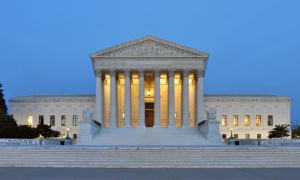Struggling With The Status Versus Conduct Distinction? So Are The Supreme Court Justices
If we had an actual war on poverty, the increase in shelter beds and conditions could make this case moot.

The U.S. Supreme Court (by Joe Ravi via Wikimedia – CC-BY-SA 3.0)
It is usually fair game for governments to regulate or criminalize the things that people do. If you get caught drinking alcohol in public, there might be some reasonable consequences. Things get a lot more sticky when you regulate what people are — locking someone up because they are an alcoholic gets you into some status territory that, according to Robinson v. California, is anathema to the Constitution. The fine line between punishing behavior and punishing status is coming to a head in a Supreme Court case that will set rules for where, and if, homeless people can sleep outside. The justices aren’t holding any punches with their questions either. From Reuters:
The justices heard arguments in an appeal by Grants Pass, Oregon of a lower court’s ruling that enforcing the city’s anti-camping ordinances against homeless people when there is no shelter space available violates the U.S. Constitution’s Eighth Amendment prohibition on cruel and unusual punishments.
…
“Where do we put them if every city, every village, every town lacks compassion and passes a law identical to this? Where are they supposed to sleep? Are they supposed to kill themselves, not sleeping?” liberal Justice Sonia Sotomayor asked Theane Evangelis, a lawyer for Grants Pass.“This is a complicated policy question,” Evangelis responded.
Sotomayor interrupted her, asking, “What’s so complicated about letting someone, somewhere, sleep with a blanket in the outside if they have nowhere to sleep?”

The Business Case For AI At Your Law Firm

Did you get the feeling that Evangelis’s response to Sotomayor’s question was a calculated sidestepping of a common sense ethical problem presented by Oregon’s anti-homeless anti-camping ordinances? Because “What else are they supposed to do, kill themselves?” might be a rhetorical question for us, but a sizable number of our neighbors up north are open to suicide as a way to deal with the homelessness problem:
Kagan’s take on the issue seems similar, as she stated that Oregon’s ordinance appears to criminalize a status. Roberts’s language is couched in status framing as well:
“You can remove the homeless status in an instant if you move to a shelter, or situations otherwise change. And, of course, it can moved the other way as well, if you’re kicked out of the shelter or whatever,” Roberts added.
Sponsored

Law Firms Now Have A Choice In Their Document Comparison Software

AI’s Impact On Law Firms Of Every Size


Generative AI In Legal Work — What’s Fact And What’s Fiction?


How Transactional Lawyers Can Better Serve (And Maintain) Their Clients
Discussing the case with this framing is worlds better than if the justices led with goofy questions like “Well, if people — anyone really, doesn’t matter if they’re rich or not — start sleeping in parks, who is going to pick up the mess? Think about our parks!” …which is the exact direction Oregon went in response:
Evangelis asked the justices to overturn the lower court’s ruling, which she called a “failed experiment which has fueled the spread of encampments while harming those it purports to protect.”
Roberts asked Evangelis what would happen in Grants Pass if its ordinances remain blocked.
“The city’s hands will be tied. It will be forced to surrender its public spaces, as it (already) has been,” Evangelis said.
I don’t know, prioritizing parts of parks over living breathing human beings being able to get some shut eye seems cruel to me, and that’s before you factor in how many members of the homeless population in Oregon are children and teenagers:
How is it not cruel to not let some teenager who has nowhere else to go catch some Zs in a park? That’s a threshold question that can’t be simply answered with “this is a complicated policy question.”
Sponsored

How Transactional Lawyers Can Better Serve (And Maintain) Their Clients

The Business Case For AI At Your Law Firm

US Supreme Court Scrutinizes Anti-Camping Laws Used Against The Homeless [Reuters]
 Chris Williams became a social media manager and assistant editor for Above the Law in June 2021. Prior to joining the staff, he moonlighted as a minor Memelord™ in the Facebook group Law School Memes for Edgy T14s. He endured Missouri long enough to graduate from Washington University in St. Louis School of Law. He is a former boatbuilder who cannot swim, a published author on critical race theory, philosophy, and humor, and has a love for cycling that occasionally annoys his peers. You can reach him by email at cwilliams@abovethelaw.com and by tweet at @WritesForRent.
Chris Williams became a social media manager and assistant editor for Above the Law in June 2021. Prior to joining the staff, he moonlighted as a minor Memelord™ in the Facebook group Law School Memes for Edgy T14s. He endured Missouri long enough to graduate from Washington University in St. Louis School of Law. He is a former boatbuilder who cannot swim, a published author on critical race theory, philosophy, and humor, and has a love for cycling that occasionally annoys his peers. You can reach him by email at cwilliams@abovethelaw.com and by tweet at @WritesForRent.







